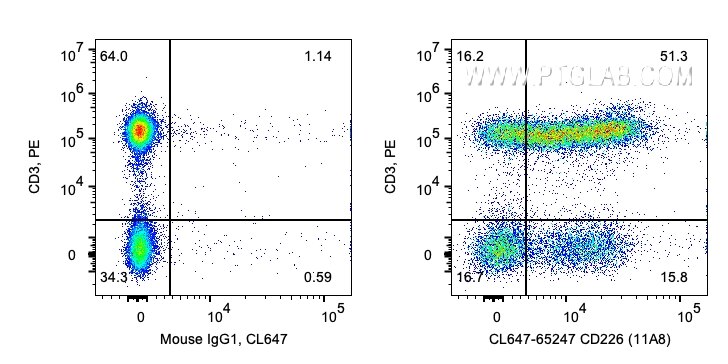Tested Applications
| Positive FC detected in | human PBMCs |
Recommended dilution
| Application | Dilution |
|---|---|
| Flow Cytometry (FC) | FC : 5 ul per 10^6 cells in 100 μl suspension |
| This reagent has been pre-titrated and tested for flow cytometric analysis. The suggested use of this reagent is 5 µl per 10^6 cells in a 100 µl suspension or 5 µl per 100 µl of whole blood. | |
| Sample-dependent, Check data in validation data gallery. | |
Product Information
CL647-65247 targets CD226 in FC applications and shows reactivity with Human samples.
| Tested Reactivity | Human |
| Host / Isotype | Mouse / IgG1, kappa |
| Class | Monoclonal |
| Type | Antibody |
| Immunogen |
Human NK Cells Predict reactive species |
| Full Name | CD226 molecule |
| Calculated Molecular Weight | 336 aa, 39 kDa |
| GenBank Accession Number | BC074787 |
| Gene Symbol | CD226 |
| Gene ID (NCBI) | 10666 |
| ENSEMBL Gene ID | ENSG00000150637 |
| RRID | AB_2935029 |
| Conjugate | CoraLite® Plus 647 Fluorescent Dye |
| Excitation/Emission Maxima Wavelengths | 654 nm / 674 nm |
| Form | Liquid |
| Purification Method | Affinity purification |
| UNIPROT ID | Q15762 |
| Storage Buffer | PBS with 0.09% sodium azide and 0.5% BSA, pH 7.3. |
| Storage Conditions | Store at 2-8°C. Avoid exposure to light. Stable for one year after shipment. |
Background Information
CD226 (DNAM-1) is a ~65 kDa glycoprotein expressed on the surface of NK cells, platelets, monocytes and a subset of T cells. It is a member of the Ig-superfamily containing 2 Ig-like domains of the V-set. CD226 mediates cellular adhesion of platelets and megakaryocytic cells to vascular endothelial cells. The protein also plays a role in megakaryocytic cell maturation. Interactions of CD226 and its ligands, CD155 and CD112, induce NK and T cell-mediated cytotoxicity and cytokine secretion (PMID: 15039383).
Protocols
| Product Specific Protocols | |
|---|---|
| FC protocol for CL Plus 647 CD226 antibody CL647-65247 | Download protocol |
| Standard Protocols | |
|---|---|
| Click here to view our Standard Protocols |




